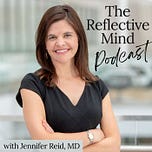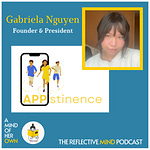Are you caught in a cycle of parental guilt, frustration, and overwhelm? In this important conversation, Dr. Jennifer Reid interviews clinical psychologist Dr. Alissa Jerud about her groundbreaking book Emotion Savvy Parenting. If you've ever found yourself yelling when you promised you wouldn't, or felt exhausted from constantly entertaining your children, this episode offers genuine relief.
Dr. Jerud shares science-backed strategies for navigating the intense emotions of parenthood without letting them control your actions. Rather than offering unrealistic "perfect parent" advice, she provides practical tools that acknowledge the messy reality of raising children while honoring your own emotional needs. This conversation is essential listening for any parent who wants to break free from emotional reactivity and build more connected relationships with their children.
Key Points
What is Emotion-Savvy Parenting?
Learning to feel strong emotions without letting them dictate your actions
Navigating the "roller coaster" of parenting emotions effectively
Practical Strategies
Stop Entertaining
Parents don't need to provide constant entertainment
Allow children to develop independent play skills
Benefits both parents (saves energy) and children (builds independence)
The CARE Skills for Emotional Regulation
Cool with ice - Use cold to rapidly reduce heart rate
Activate your body - Brief exercise to discharge energy
Relax your muscles - Tense then release for effective relaxation
Exhale slowly - Focus on long exhales rather than deep breaths
Mindful Presence
Be fully present during calm moments with children
Simply observe children without judgment or intervention
Use routine moments (bath time, bedtime, car rides) for connection
Expert Insights
Exposure therapy breaks the habit of anxiety avoidance
DBT skills help with mindfulness, emotion regulation, and distress tolerance
Control attempts typically backfire; acceptance is more effective
Quote to Remember
"Emotion savvy doesn't mean not ever feeling strong, unwanted emotions... But I want to help parents learn they can feel those feelings and not need to let those feelings dictate what they do or don't do."
About Dr. Alissa Jerud
Dr. Alissa Jerud, PhD is a mother of two, a licensed clinical psychologist, a Clinical Assistant Professor at the University of Pennsylvania, and the author of the forthcoming book, Emotion-Savvy Parenting, a compassionate, science-informed guide for relating more skillfully to painful, unwanted emotions.
In her private practice, Dr. Jerud specializes in highly effective, exposure-based treatments for anxiety-related disorders, as well as Dialectical Behavior Therapy (DBT) skills. She also trains other clinicians in exposure-based treatments and gives workshops on anxiety, stress, mental health, parenting, and social support to companies large and small.
Dr. Reid on Instagram: @jenreidmd and LinkedIn
Also check out Dr. Reid's regular contributions to Psychology Today: Think Like a Shrink.
Seeking a mental health provider? Try Psychology Today
National Suicide Prevention Lifeline: 1-800-273-8255
Dial 988 for mental health crisis support
SAMHSA's National Helpline - 1-800-662-HELP (4357)
-a free, confidential, 24/7, 365-day-a-year treatment referral and information service (in English and Spanish) for individuals and families facing mental and/or substance use disorders.
Disclaimer:
The views expressed on this podcast reflect those of the host and guests, and are not associated with any organization or academic site.
The information and other content provided on this podcast or in any linked materials, are not intended and should not be construed as medical advice, nor is the information a substitute for professional medical expertise or treatment. All content, including text, graphics, images and information, contained on or available through this website is for general information purposes only.
If you or any other person has a medical concern, you should consult with your health care provider or seek other professional medical treatment. Never disregard professional medical advice or delay in seeking it because of something that have read on this website, blog or in any linked materials. If you think you may have a medical emergency, call your doctor or emergency services (911) immediately. You can also access the National Suicide Help Line at 1-800-273-8255 or call 988 for mental health emergencies.














Share this post